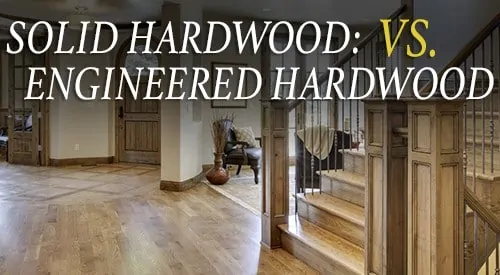Working in a remodeling and building materials company, i’ve learned that most people don’t understand the differences of solid hardwood vs. engineered hardwood.
And why would they? No one is really educating them about these differences before they go looking for a new floor, they somehow just expect you to know and make the right decision.
But I’m here to make sure you’re decision is an INFORMED one. Flooring is a big expense, and you want to choose something that you’ll love for the next few decades. Lets’s get ready to compare all of the top questions I hear about solid hardwood vs. engineered hardwood!
Solid Hardwood VS. Engineered Hardwood on Composition.
Solid Hardwood:
Solid hardwood flooring is constructed with 100% hardwood and each plank is a single solid piece. Solid hardwood is traditionally 3/4″ thick, except for parquet-style floors which are thinner.
Engineered Hardwood:
Unlike solid wood floors that are milled from one solid (surprise!) piece of lumber, engineered hardwood floors are composed of multiple plies of wood with a solid wood veneer. Underneath the veneer, cross layers of plywood are pressed together to a strong and moisture-resistant core. These board typically vary between 3/4” to1/2”, with 3/4″ starting to emerge more frequently.
You’re still getting real hardwood floors; they’re just made differently. The layers typically include a top veneer of hardwood backed by less expensive layers of plywood—although some manufacturers use substrates made from recycled wood fibers mixed with stone dust for improved durability and stability.
Solid Hardwood VS. Engineered Hardwood on Installation
Solid Hardwood:
Solid hardwood used a nail down or staple down installation technique. It can’t typically be installed directly over concrete or radiant heating systems. It’s typically best to install solid hardwood on the first and second floors of your home as opposed to in the basement. Solid hardwood is never installed on a floating basis.
Engineered Hardwood:
Engineered hardwood flooring has multiple installation options: staple, glue or floating, such as click and lock, on some products. It can be used in basements on concrete, or on radiant heating systems.
Solid Hardwood VS. Engineered Hardwood on Style
Solid Hardwood:
Solid hardware comes in and pre-finished options, and also has a ton of wood species types to choose from! Long and wide planks are also an option.
Engineered Hardwood:
There are fewer wood species choices than with solid hardwood. Some of the most popular are Red oak, hickory, and Brazilian Cherry. Its very uncommon to find unfinished engineered hardwood, as most is pre-finished.
Solid Hardwood VS. Engineered Hardwood on Maintenance & Durability
Solid Hardwood:
Solid hardwood is known for its endurance. Because it is solid through and through, it can be sanded and refinished multiple times during a lifetime. And solid construction holds up well over time. Solid hardwood durability mostly comes down to the wood species and wear-resistance of its protective finish. Harder woods such as Hickory and Oak are more dent resistant, and those with more resilient finishes will perform best against scratches. Well-maintained solid hardwood will last for decades. Moisture is the enemy of this organic product.
Engineered Hardwood:
The durability of solid hardwood vs engineered hardwood is close, but not identical. Engineered wood can be sanded and refinished several times throughout the life of the floor, sometimes up to 5. If your durability concerns are around moisture, humidity or temperature, engineered is the way to go. Its layered construction provides stability against environmental changes. Because the surface is thin, it can become chipped or de-laminated if stressed beyond normal conditions. Yet its ability to hold up to limited moisture helps bring up its durability rating.
Solid Hardwood VS. Engineered Hardwood on Price & Resell Value
Solid Hardwood:
Solid is the gold standard in flooring, and it’s usually the most price-premium board for board. There are, of course, many variables: solid hardwood collections can vary in price depending on the warranty, protective finish and how many finishing processes have been used to achieve a particular look.
As long as the floor is in good shape, it is on equal terms regarding resell value as engineered wood flooring.
Engineered Hardwood:
As a whole, engineered hardwood tends to be less expensive than solid hardwood, with the exception of premium collections that have a thicker hardwood top layer, uniquely artistic designs and enhanced durability. High-performance engineered products are also more on par with solid pricing.
Engineered hardwood has a GREAT resell value. Because engineered wood floors are real wood, they can be advertised as such in real estate, making them more attractive to buyers.
Conclusion:
Overall, in the battle of solid hardwood vs. engineered hardwood, they are pretty neck and neck. It comes down to location of installation, and personal preference for the most part. Whether you’re going with solid hardwood or engineered, you’re going to be thrilled with the outcome!
Builders Surplus is a full service renovation company with locations in Louisville, Kentucky, and Newport, Kentucky, which also serves Cincinnati, Ohio. We carry a large selection of solid hardwood and unfinished hardwood flooring, as well as laminate, Luxury Vinyl Tile waterproof flooring, and carpet. We write about interior design, home decor, decorating ideas, and home improvement. We hope you’ll check back in for our next article! Happy Renovation!
Written By: Allie Bloyd
Source
https://builderssurplus.us/laminate-flooring-hardwood/solid-hardwood-vs-engineered-hardwood/
